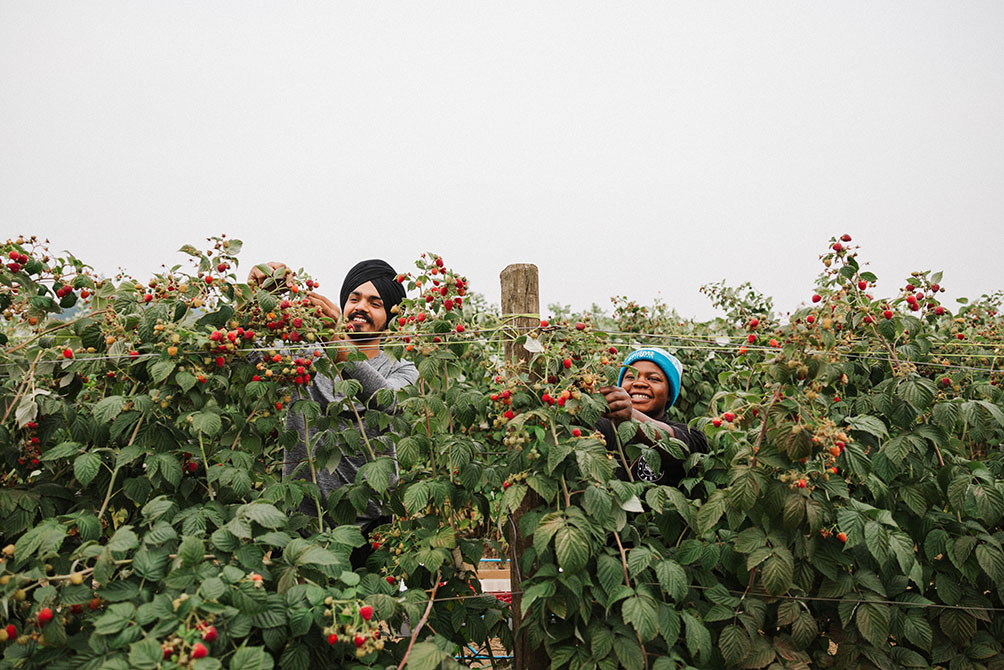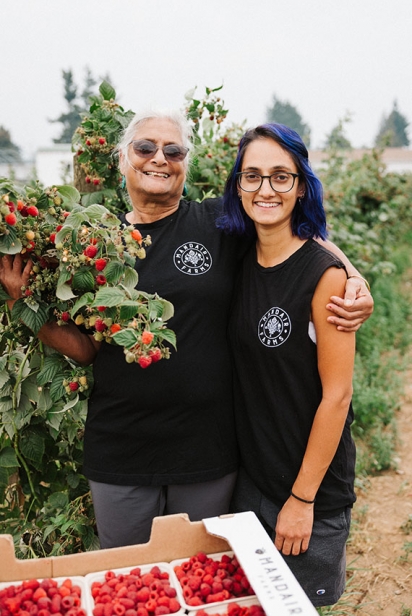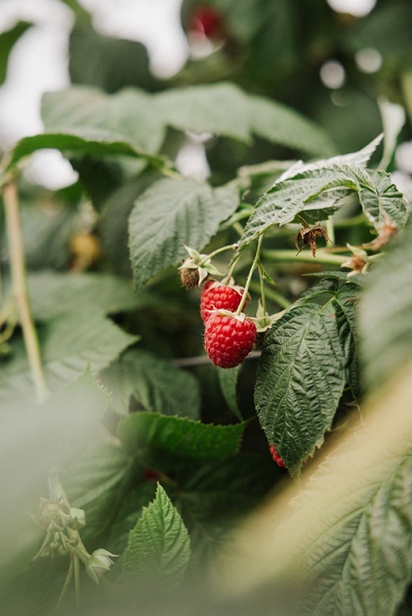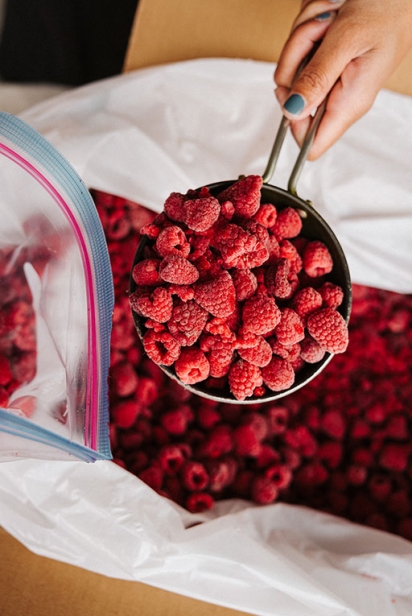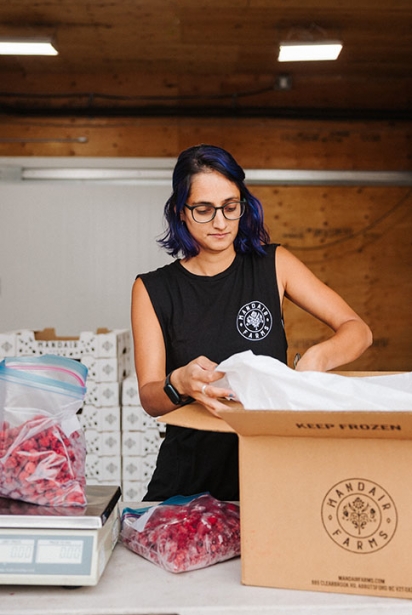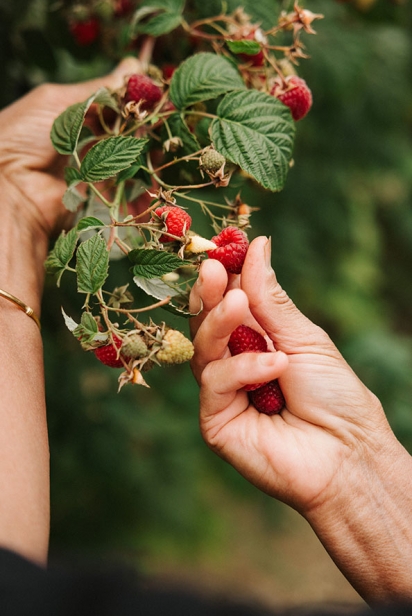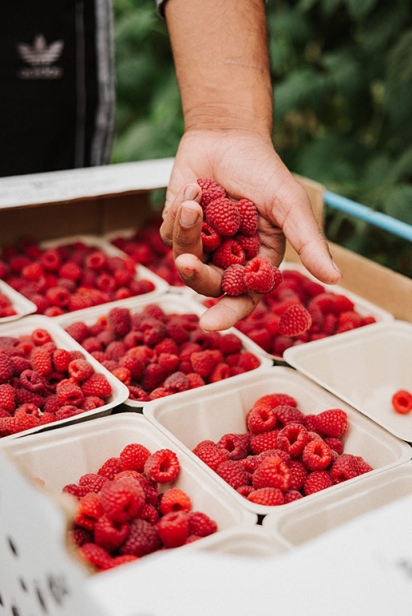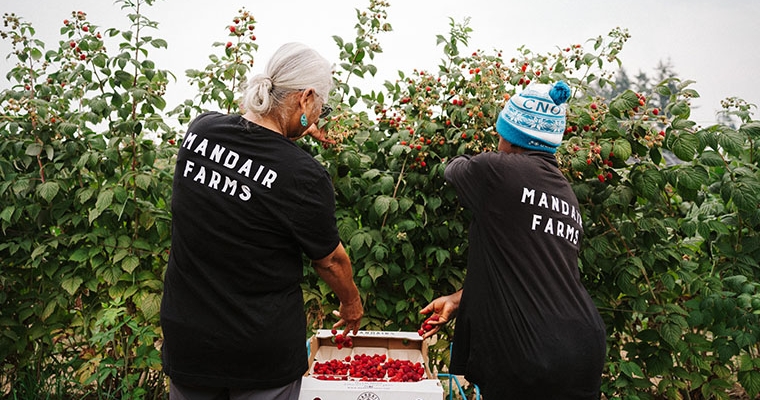Keep B.C. in the Berry Business
It wasn’t until members of the Mandair family emerged from their Abbotsford home in the evening that they could take in the extent of the day’s damage. The pressure cooker heat had turned acres of raspberries into jam on the vine. The plants had collapsed under the hot, stagnant air, their leaves browned, curled and crisp. “I’m pretty sure all of us cried a little bit,” Ramneek Kingra recalls. “We said to ourselves, ‘this was our bread and butter for the next three weeks. Now what?’”
The raspberries at Mandair Farms in Abbotsford were hit hard by the record-breaking temperatures of the 2021 western heat dome. Of all British Columbia’s crops, raspberries were most affected, with production dropping by more than one-third that year, according to Agriculture and Agri-Food Canada. Over the past five years, raspberry growers have endured not only multiple extreme weather events but also a global pandemic, rising costs and growing global market competition.
Abbotsford continues to be the raspberry capital of Canada. Last year, more than 70 per cent of the country’s raspberries were grown in B.C., most in the vicinity of the Abbotsford International Airport. But production has significantly declined since the late 1980s. Faced with multiple challenges, many of the 500 growers who operated at the industry’s peak have since given up, some turning to hardier crops such as blueberries. Mandair Farms is one of the approximately 90 remaining farms. It is exploring ways to adapt.
“The best thing to come out of COVID”
The Mandair family has been farming for four generations. After his father died in 2015, Sajan Mandair took on the role of lead farmer at only 22 years old, with a goal of keeping the family tradition alive. His sister-in-law, Ramneek, manages the farm.
“She’s good at bossing people around,” laughs Sajan’s mother, Jasbir Mandair, “Even me.”
Over the past decade, the family has turned the berry farm into a full-time business.
During the harvest, Jasbir’s home kitchen feels like the centre of a busy beehive. As she stirs an oversized pot that will become lunch for the farm workers, her phone buzzes away with family members calling, while others fly through to greet her. Farm and family intertwine as the day’s harvest, deliveries and markets are co-ordinated across multiple cities.
Vancouver Farmers Markets regulars will be familiar with Jasbir’s kale-filled pakoras, which are the perfect hot, crunchy antidote to a damp Vancouver day. While snacking on those, customers can take their pick of various preserves, and of course, fresh berries in the summer (raspberries, strawberries, blueberries and blackberries) and three-pound bags of frozen berries year-round.
Of all the berries grown at Mandair Farms, raspberries have proven the trickiest. As Ramneek explains, “It’s such a hard fruit to grow…” Raspberries are a fragile fruit that must be picked immediately when ripe, handled carefully to avoid crushing and consumed within five days or risk becoming moldy. While ripe blueberries can last a few days on the vine, raspberries demand urgent attention. “When they turn ripe, we need to be in the field picking that day, otherwise they turn to mush,” says Ramneek.
But when the pandemic hit in spring 2020, the Mandairs worried their raspberries would have to wait more than just a few days. Considering their 13 acres of raspberries soon to ripen, Ramneek recalls the family asking, “What happens to our berries if the markets are cancelled?” At that time, “No one knew how long the pandemic would last… it was all up in the air.”
So the Mandairs did what many families have done throughout history in the face of uncertainty: They pivoted to preserve their harvest by taking out a loan to build a walk-in freezer. As the harvest came in that year, they were able to move any berries that didn’t make it to customers within a few days from their cooler into the new freezer.
As we now know, many farmers markets remained open. Still, Ramneek considers the freezer to be “The best thing to come out of COVID.” Since spring 2020, it has become a cornerstone of Mandair Farms’ operations. Today Ramneek estimates that half of the raspberries the family grows are frozen. “We pack the freezer to the brim,” she says. “It gives us something to look forward to in the winter.”
While the raspberry season winds down by fall, growers like the Mandairs, who primarily sell (unprocessed) fresh berries, can spread out their revenue throughout the year by freezing a portion of their harvest. Freezing enables Mandair Farms to offer businesses, such as Earnest Ice Cream and several others it supplies, more options.
“[Freezing the berries] really locks in their peak summer flavour and provides us with the flexibility of a longer shelf life,” says Earnest Ice Cream co-founder Erica Bernardi. “We love that each year’s harvest is different, and every year [Mandair Farms] raspberries are vibrant and delicious, sometimes sweeter or more floral, or with deep berry flavours coming through.”
Now the primary supplier of the berries in Earnest’s long-standing raspberry ice cream flavour (both the plant-based and dairy options), Mandair Farms first connected with the scoop shop as fellow vendors at the Vancouver Farmers Markets in 2018. This is also how the Mandairs first met Oh Sweet Day! Bake Shop owner Fanny Lam. The Commercial Drive sweet treat staple strives to feature Mandair Farms raspberries in as many baked goods as possible — from buttercream cakes to beautifully blushing mini mousse cakes.
The Mandairs aim to have consistent attendance at markets so customers know they can count on them for bags of frozen berries every week throughout the year. As Ramneek explains, “People used to buy 100 to 200 pounds of fresh berries in summer to freeze themselves for winter. Now almost no one buys in bulk [in summer].” She adds, “We hear from our customers,‘Why would we waste space in our freezer and have it sit there all winter when we know you will sell a three-pound (1.4 kilogram) bag every week at the market.”
Freezing berries has also meant fewer are wasted. Ramneek estimates that on average, Mandair Farms produces the equivalent of only two household green bins worth of berry waste each year. Given the raspberries’ short shelf life, freezing has been particularly important to minimizing the number that become part of the nearly 60 per cent of food produced in Canada that is lost or wasted.
The life of a Fraser Valley raspberry
Red raspberries (Rubus idaeus L.) come into season as early as June, after the first strawberries and around the same time as blueberries. According to Lisa Craig, manager at the Raspberry Industry Development Council, some B.C. raspberries are consumed fresh, but the majority (more than 85 per cent) are frozen or processed into products such as purée and juice at facilities in the Fraser Valley or the United States. These products are either sold to consumers or used by manufacturers to make jam ice cream, yogurt, desserts, alcohol and other value-added products.
Most processed raspberries are machine harvested, while those consumed fresh are picked by hand and go straight into the package they’re sold in to reduce handling, avoid crushing and extend their already limited shelf life. Given their extreme perishability, if consumers are eating a fresh Fraser Valley raspberry, it was likely picked fewer than 24 hours ago.
As the demand for (and expectation of) fresh raspberries yearround increases, a growing proportion of the raspberries eaten in B.C. are imported from Mexico, the U.S., Eastern Europe, Chile and China. This means B.C. berries need to compete or lose their place at the table.
Breeding better berries
A key ingredient in the recipe for remaining competitive? Breeding new varieties. Specifically, new raspberry varieties that can be machine-harvested while still being of high enough quality to be individually quick frozen (IQF). As Michael Dossett, who runs B.C.’s berry breeding program explains, “If you can consistently get high grade IQF fruit, that offers the highest [profit] margin to the grower.”
Dossett joined the B.C. berry breeding program in 2011. When he first ran a machine harvester through the program’s plots in 2012, it was, “eye opening,” he says. Only about 10 per cent of the berries retained their shape after being machine harvested. Given that the majority of B.C. growers machine harvest, they were clearly missing the mark. But, that’s since changed.
“We have really reinvented the raspberry [breeding] program over the last decade,” he says. “Today, 80 to 90 per cent look good off the harvester.” This also benefits farms growing for the fresh market: If a berry is firm enough to make it through a machine harvester in one piece, it is also easier to pick by hand.
Breeding is a long game that requires incredible patience. From the first “cross” between two parent plants to when a new variety can be named and released to commercial growers, it can take one or even two decades. Every year, Dossett starts with 4,000 to 6,000 seedlings, each genetically unique. Through careful selections based on desired traits, from superior taste to disease resistance, he slowly whittles this number down until he is left with only the “best of the best.” The top one or two per cent of each cohort are saved for further trials as part of the program’s library of genetic material or “germplasm.” Of these, even fewer ultimately become new varieties.
Since B.C.’s raspberry breeding program began in the late 1950s, it has released 20 new and improved varieties. “Squamish,” the most recently released variety was named in 2014. While it has taken some time to get there, Dossett anticipates the program will soon be on track to release a new variety every couple of years. And new, more competitive varieties could mean a greater share of raspberries in the freezer aisles of the future are from the Fraser Valley.
Showing local raspberries some love
Until then, B.C. raspberries could use some love. Raspberry fans can show their support for the delicate heart of B.C. berries long after the growing season has passed by purchasing three-pound bags or 30-pound (13.6 kilogram) cases of frozen berries from Mandair Farms at winter farmers markets in Vancouver, Port Moody and Squamish. Bergen Farms is another example of a farm selling under its own label. Its 600- gram bags and 1.8-kilogram boxes can be purchased at Thrifty Foods.
As a self-declared “fruit snob” who lives, eats and breathes berries, Dossett can tell where a bag of frozen raspberries was grown by their taste and appearance alone, even if sold under the same brand name. But for the rest of us, we’ll need to track down locally grown frozen berries at the grocery store by turning the bag over and checking its label. If a label says the product is produced in Canada, chances are those berries were grown in the Fraser Valley. “If we can get people in the habit of buying [frozen] raspberries when our fresh ones are not in season, it supports the market overall,” Dossett says.
When asked why Mandair Farms still grows raspberries, despite the challenges, Ramneek laughs. “We love the craziness of it… I think we’d be bored if we just grew blueberries.”
“It’s hard, what we’ve done,” Jasbir adds. “We had the pandemic and heat dome, but we’ve had some really good days since then. I think farmers just love feeding people, no matter what the cost.”
Mandair Farms
889 Clearbrook Rd., Abbotsford
mandairfarms.com | 604.849.5252 | @mandairfarms
Find Mandair Farm raspberries at: Rain or Shine, Elephant Garden Creamery, Frostbites Syrup Co., LIVIA Forno e Vino and the Jewish Family Services (JFS), which has an online order and pickup system for their frozen berries, jams and pickles.


